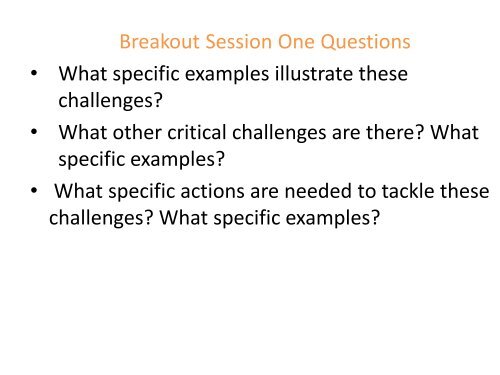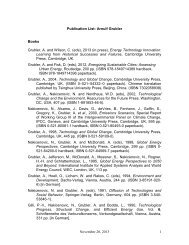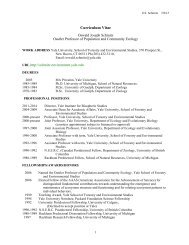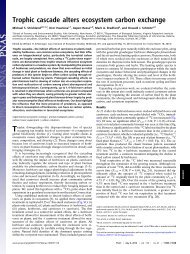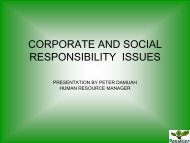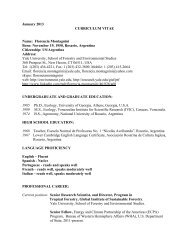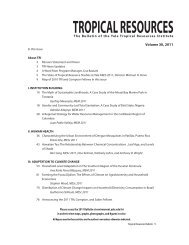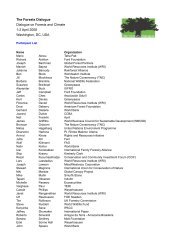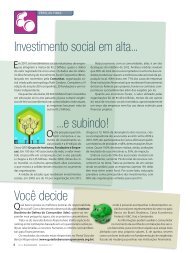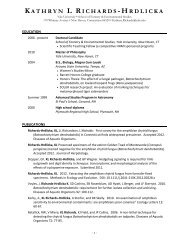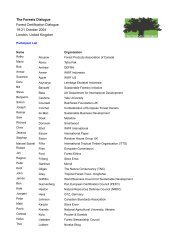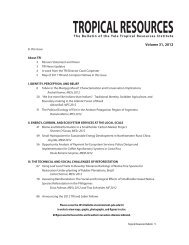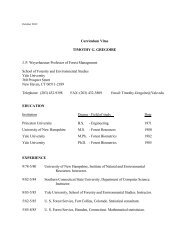Breakout Session One Questions • What specific examples illustrate ...
Breakout Session One Questions • What specific examples illustrate ...
Breakout Session One Questions • What specific examples illustrate ...
Create successful ePaper yourself
Turn your PDF publications into a flip-book with our unique Google optimized e-Paper software.
<strong>Breakout</strong> <strong>Session</strong> <strong>One</strong> <strong>Questions</strong><br />
<strong>•</strong> <strong>What</strong> <strong>specific</strong> <strong>examples</strong> <strong>illustrate</strong> these<br />
challenges?<br />
<strong>•</strong> <strong>What</strong> other critical challenges are there? <strong>What</strong><br />
<strong>specific</strong> <strong>examples</strong>?<br />
<strong>•</strong> <strong>What</strong> <strong>specific</strong> actions are needed to tackle these<br />
challenges? <strong>What</strong> <strong>specific</strong> <strong>examples</strong>?
<strong>Breakout</strong> Groups<br />
1. Engagement<br />
– Facilitator: Gary Dunning<br />
– Rapporteur: Sarah Price<br />
2. Policy and Legal Reform<br />
– Facilitator: James Mayers<br />
– Rapporteur: Monique Vanni<br />
3. Information<br />
1. Facilitator: Joe Lawson<br />
2. Rapporteur: Xiaoting Hou<br />
4. Cost and Benefit Management<br />
1. Facilitator: Jeannette Gurung<br />
2. Rapporteur: Connie Espinosa<br />
5. Integration<br />
1. Facilitator: Stewart Maginnis<br />
2. Rapporteur: Jan Willem den Besten
Group <strong>One</strong> Report Back<br />
Engagement
Challenges<br />
<strong>•</strong> Clarity about who, what, why to engage<br />
– Different Models discussed on Stakeholder<br />
representation & legitimacy:<br />
<strong>•</strong> Nomination process<br />
<strong>•</strong> Assigned<br />
<strong>•</strong> Mapping Rights holders
Challenges<br />
<strong>•</strong> Clarity on when and for how long.<br />
Ways Forward: Plan ahead. Minimize time<br />
required. Distribute meeting locations.<br />
Recognize flexibility is required. Do<br />
consultation retroactively when necessary –<br />
be willing to adjust
<strong>•</strong> Engagement in <strong>What</strong>?<br />
Need <strong>specific</strong>ation on different phases.<br />
<strong>•</strong> Example: one organization involved in<br />
monitoring, validation, consultation, etc.<br />
Legitimacy<br />
<strong>•</strong> Often operating in advance of<br />
intergovernmental processes. There is an<br />
uncertainty.
Challenges<br />
<strong>•</strong> Ensuring Effective implementation of what<br />
you agree through engagement.<br />
How to measure success of process? Indictors of<br />
successful engagement? Who decides:<br />
Indonesia: Government.
Challenges<br />
<strong>•</strong> Ensuring Policy responses to outcome:<br />
<strong>What</strong> is the role of Parliament? How to bring<br />
decision makers into it? Members of<br />
Parliament on task force? Indonesia or Peru<br />
might provide <strong>examples</strong>. (Peru, by engaging in<br />
new REDD friendly legislation. Law on<br />
Ecosystem Services: Lessing contradictions
Challenges<br />
-Need flexibility on outcomes.<br />
Open to letting stakeholder process advance and<br />
reach outcome.
WAYS FORWARD<br />
<strong>•</strong> Integrate stakeholder needs in global negotiation<br />
processes (and vice versa. )<br />
<strong>•</strong> Bringing global negotiation process to local level.<br />
Integrate into other spaces: lacey Act, Rio+20, CBD, EUTR, etc.<br />
Integration of different platforms: cross pollination of focal<br />
points on different task forces.<br />
How to take current state of negotiation & international REDD<br />
Arrangements to the LOCAL level
Way Forward<br />
<strong>•</strong> How to get higher involvement from private<br />
sector?<br />
<strong>•</strong> Tailor REDD to priorities of real stakeholders<br />
<strong>•</strong> Engagement of commonly marginalized<br />
groups<br />
<strong>•</strong> Support more multi-lateral sharing initiatives<br />
like TFD.
Group Two Report Back<br />
Information
Challenges<br />
In the report, list <strong>specific</strong> issues and avoid general negative statements<br />
<strong>•</strong> The scale of the ‘un-informed” is not only huge but diverse<br />
<strong>•</strong> Barriers of obtaining information<br />
– How to translate scientific information for policy makers at national and<br />
local level<br />
– Different education levels<br />
– Different languages<br />
– Different formats of information that hinder access<br />
– Lack of relevance of information that leads to lack of interest<br />
<strong>•</strong> Quality of Information is variable:<br />
(Current challenge is identified as “Quality of information is currently not<br />
verifiable”)<br />
– Impossible to control all the information, but need to focus on how to<br />
consolidate and distill out irrelevant information and how to use<br />
information
Issues and Ways Forward<br />
Huge scale and diverse group of “uninformed”<br />
– Translate and Adapt languages to local realities : Connect the information to the reality,<br />
not theory: show some <strong>specific</strong> <strong>examples</strong> to the communities<br />
Quality and relevance of Information:<br />
– Information should be managed responsibly and need to be precise<br />
– Identify stakeholder needs; Not all information is for every one.<br />
Resources for implementation<br />
– Recognize the importance of information within national REDD+ plans<br />
– Recognize the need for financing<br />
– Explore creative Financing<br />
– Integrate information into different components of REDD strategy implementation that<br />
has already been funded<br />
A challenge in Mozambique: Information on forest carbon are not well captured nor transparent<br />
– Rebuild forest data for MRV system and recognize the need for financial support<br />
– Pressure from international donors and initiative to ensure transparency
Ways Forward<br />
Build on and map existing information sharing platforms:<br />
e.g REDD+ partnership mandate to create a database of REDD+ Financing and identify the<br />
gaps<br />
Information flow between international, national and local levels<br />
-Training of Trainers rooted in local communities ; e.g. Vietnam<br />
-Build different levels of networks community representatives to reach national and<br />
international level. This applies to government too<br />
Incorporate traditional knowledge into the REDD strategy<br />
– Benefit Distribution: e.g. Ghana and Vietnam<br />
– MRV: e.g. community participatory carbon monitoring in Vietnam;<br />
– FPIC is a tool : e.g. Indonesia<br />
For information to be translated into actions, it needs to be more than dissemination:<br />
– Piloting activities: more proactive way of learning<br />
– Hands-on training that is more active e.g. MRV take people to look at concrete <strong>examples</strong><br />
instead of workshops<br />
Looking beyond forest sector and country for information: to look at practical tools that can help<br />
us move forward on information dissemination E.g. Agriculture E.g. China
Group Three Report Back<br />
Policy and Legal Reform
Challenges<br />
<strong>•</strong> Tenure and carbon rights<br />
Overall, there are still big challenges in defining tenure<br />
and carbon rights.<br />
But the REDD Readiness process has pushed discussions<br />
in all countries, and tenure/carbon rights are key<br />
components of existing REDD processes at the national<br />
level<br />
There is concern that if REDD is dependent on tenure,<br />
there will be a land grab
Challenges<br />
<strong>•</strong> Integration into wider development agenda<br />
In general, although there is a recognition that<br />
REDD+ has serious development ramifications,<br />
there have been very little successful efforts at<br />
integration. The weakness of environmental<br />
ministries is a key hurdle.<br />
The tendency to build large commissions across<br />
governments, although positive, also diminishes<br />
effectiveness and accountability
Ways forward<br />
<strong>•</strong> There needs to be a broader international discussion<br />
and definition of what carbon rights are (scope)<br />
<strong>•</strong> Working through concessions allows governments to<br />
allow for distribution benefit while retaining a measure<br />
of control, and to gain from taxation.<br />
<strong>•</strong> There are national programmes, particularly in<br />
Guatemala, where tenure has been bypassed for the<br />
delivery of incentives, which can be used as a base for<br />
REDD benefit distribution<br />
<strong>•</strong> Having different parts of a government performing<br />
different activities (financing vs. MRV), provides checks<br />
and balances and increases accountability
Ways forward<br />
<strong>•</strong> Pushing through institutional reform requires<br />
very strong grassroots support. This is better<br />
achieved by engaging communities with a<br />
whole, inclusive discussion on the role forests,<br />
and not just narrowly about REDD. This<br />
support needs to be led by communities, not<br />
just NGOs (MESOCARBON)<br />
<strong>•</strong> Cross-sectoral engagement is better achieved<br />
at high executive level
Ways forward<br />
<strong>•</strong> To speed up institutionalization, using executive<br />
decision-making powers to build significant<br />
clusters of legislation before going to legislative is<br />
a way forward (Ecuador and Guatemala)<br />
<strong>•</strong> Safeguards: Setting up community MRV is an<br />
important way to include safeguards. But there<br />
needs to be capacity building to unify ways of<br />
monitoring, so that there is room for<br />
coordination (Guyana).
Ways forward<br />
<strong>•</strong> MRV: to ensure the sovereignty of their MRV,<br />
Guatemala are setting up their own satellite<br />
monitoring system<br />
<strong>•</strong> Integration into other incentive programmes:<br />
REDD revenue will be used to roll out<br />
community forestry throughout Guatemalan<br />
territory. Ecuador is working on how to not<br />
double pay benefits from REDD and<br />
Sociobosque
Ways forward<br />
<strong>•</strong> FPIC is essential to REDD, but needs to be<br />
done in a continuous way, not as a formality.<br />
FPIC processes have shown to be important<br />
sources of information for policy-making.
Group Four Report Back<br />
Benefit and Cost Management
Examples of challenge: Cambodia<br />
<strong>•</strong> Has been difficult to propose a framework for BS<br />
based on existing experiences.<br />
<strong>•</strong> There is no a legal framework yet.<br />
<strong>•</strong> There is a need to link with Ministry Economy and<br />
Finance – they will receive the funds<br />
<strong>•</strong> <strong>One</strong> idea is to create benefit sharing mechanism at<br />
the national and one at the sub-national level. Initial<br />
distribution of existing funds between these 2 levels<br />
will still have to be negotiated<br />
<strong>•</strong> The challenge is how the fund will be managed
Examples of way forward: Guatemala<br />
<strong>•</strong> High interest in developing projects to the voluntary market<br />
<strong>•</strong> NGOs have linked those initiatives with the national REDD process –<br />
build of subnational MRV systems<br />
<strong>•</strong> Proposal: to create a financial mechanism at subnational level that<br />
works for the voluntary market: Special Proposal vehicle SPV: allows<br />
that the funds are kept safe, ensues management accountability, all<br />
actors define how to invest the resources.<br />
<strong>•</strong> Funds can be assigned for REDD activities as well as for<br />
strengthening governance in general for REDD<br />
<strong>•</strong> Lesson learned: given the private sector a clear role<br />
<strong>•</strong> The country is supporting the preparation of sub-national MRV<br />
systems plus providing a “financial” mechanism for promoting the<br />
investors of the voluntary market.
Additional CHALLENGES?<br />
<strong>•</strong> There is a need to wait for the compliance<br />
market – formal market under the UNFCCC<br />
<strong>•</strong> Concern that the process will take 5 or more<br />
years<br />
<strong>•</strong> WF: Sources are coming from Bilateral<br />
agreements and other voluntary mechanism.
Ways forward<br />
<strong>•</strong> MRV system linked with BS mechanisms to work – any room for<br />
proxis?<br />
<strong>•</strong> Land tenure arrangements<br />
<strong>•</strong> REDD activities need to be integrated into broader initiatives so<br />
actions don’t rely only on REDD funding<br />
<strong>•</strong> Think about “integrated approaches for REDD” in countries: it’s an<br />
opportunity not only for land tenure but also human rights, and<br />
equity are an integral part of a REDD benefit sharing mechanisms.<br />
<strong>•</strong> The medullar element for ensuring an equitable and transparent<br />
benefit sharing mechanism system is participation of stakeholders<br />
in decision making: REDD national framework, REDD national<br />
activities and the mechanism in itself. Socialization of information.
Ways forward<br />
<strong>•</strong> Create a system that incentivize “lower cost” approach<br />
for implementing REDD activities so “NET” benefits can<br />
be significant for further distribution between<br />
communities, government and project developer<br />
<strong>•</strong> Testing distribution schemes offer a room of<br />
opportunities. Its needed awareness raising and<br />
capacity building for communities / organizations so<br />
actors understand their role in such an agreements.<br />
<strong>•</strong> Build early actions linked with the national process – to<br />
build a process in steps
Other messages<br />
<strong>•</strong> Carbon market is not necessarily only<br />
international but also national. Would be<br />
interesting to promote this.<br />
<strong>•</strong> Benefits should not only be understood about<br />
money.<br />
<strong>•</strong> Methodological tools to define how much is<br />
going to be available for distributing<br />
<strong>•</strong> The issue of rights in the summary seems to<br />
vanished
Group Five Report Back<br />
Integration
Main themes<br />
<strong>•</strong> <strong>One</strong> of the challenges of integration<br />
<strong>•</strong> Integration is most difficult to achieve among<br />
government departments<br />
<strong>•</strong> Civil servants paid to focus on singular issues<br />
<strong>•</strong> Integration more easy to be reached because<br />
they have to look at the various factors that<br />
influence their bottom line<br />
<strong>•</strong> Imperative for communities because their<br />
livelihoods don’t operate at a sectoral basis
Main themes<br />
<strong>•</strong> Integration across different levels of<br />
government<br />
– Between sectors<br />
– Between ministries<br />
– National-sub-national integration presents a major<br />
challenge to implement REDD<br />
– National governments make commitments<br />
– But sub-national authorities need to stimulate<br />
economic development and activity
Inter-sectoral integration<br />
<strong>•</strong> High level champion rooted into the office of the<br />
presidency<br />
<strong>•</strong> Theory: being part of a presidential committee<br />
low carbon strategy of which REDD is part<br />
<strong>•</strong> Some experience: difficult to move ahead<br />
<strong>•</strong> Task force on REDD+ has proven more effective<br />
(still cross-sectoral)<br />
<strong>•</strong> Lesson: too much ambition in integration might<br />
be counter productive in the short term.<br />
<strong>•</strong> Integration in the forest and land use sectors
National-sub-national integration<br />
<strong>•</strong> Need to invest in capacity building<br />
<strong>•</strong> Deal head-on with benefit sharing between<br />
national and sub-national governments<br />
<strong>•</strong> Experience from Indonesia: Strategic<br />
framework nationally but means of<br />
implementation decided locally
Integration with non-state actors:<br />
Communities<br />
<strong>•</strong> Communities need<br />
– Conversation about REDD but about community<br />
based conservation<br />
– Genuine information<br />
– Their knowledge reflected back upwards<br />
– Reviving locally based extension agent in REDD<br />
pilot areas<br />
<strong>•</strong> Help with information<br />
<strong>•</strong> Facilitate community dialogue<br />
<strong>•</strong> Facilitate upward flow of knowledge and information
Private sector<br />
<strong>•</strong> Work through associations<br />
<strong>•</strong> Preference to engage with decentralized<br />
structures<br />
<strong>•</strong> Benefit sharing is an integration issue. Clarity<br />
on shared benefits can contribute to improved<br />
integration on land use decision making


